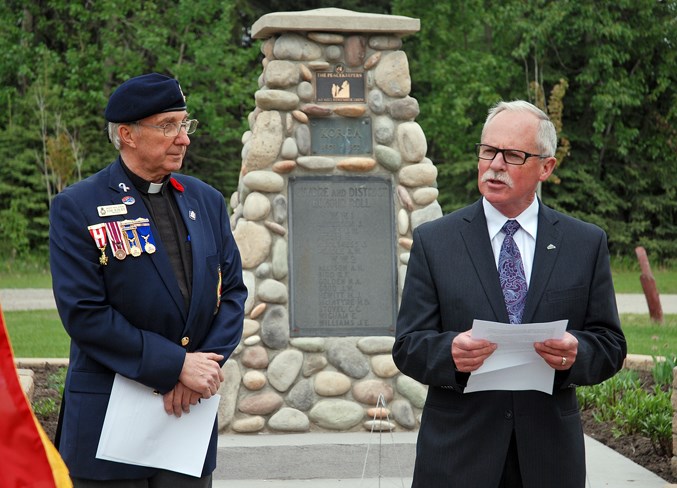Sundre is now home to a small piece of Juno Beach.
Bergen-area resident Grant Schwartzenberger sprinkled a small handful of sand from the beach next to the cenotaph at Veterans’ Homecoming Park on June 6 during a ceremony observing the 75th anniversary since Allied troops opened a western front against Hitler’s war machine.
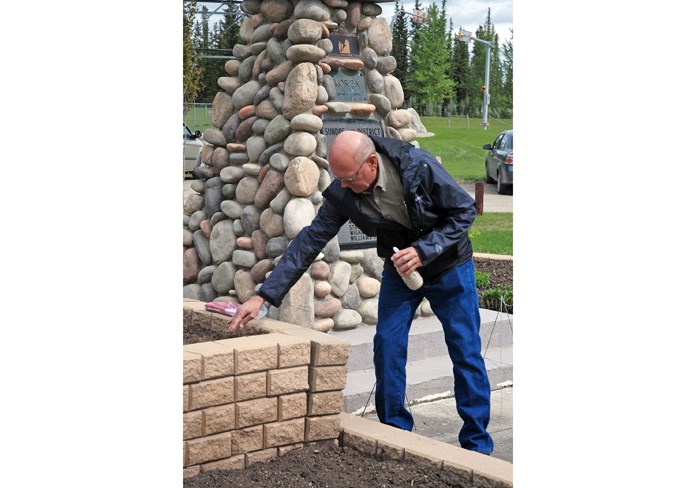 Grant Schwartzenberger, who in 2016 visited Juno Beach accompanied by wife Leila to retrace the steps of his late father Anthony, spread near the cenotaph during the service a small handful of sand he had scooped from the beach. Simon Ducatel/MVP Staff
Grant Schwartzenberger, who in 2016 visited Juno Beach accompanied by wife Leila to retrace the steps of his late father Anthony, spread near the cenotaph during the service a small handful of sand he had scooped from the beach. Simon Ducatel/MVP Staff
On June 6, 1944, tens of thousands of soldiers from three U.S. divisions, one British and one Canadian division stormed five beaches in a bloody but successful mission to break the grip of Nazi-occupied western Europe.
Schwartzenberger’s father Tony was an infantryman who arrived in Normandy on D-Day plus 7, and was later wounded, captured and held prisoner until the end of the Second World War in Europe about nine months later. In 2016, Grant visited Juno beach with his wife Leila to retrace his father’s steps, and along the way he filled up a small plastic bottle with sand.
He was among a modest gathering of fewer than two dozen people, including members of the Sundre Royal Canadian Legion Branch #223, who attended last Thursday’s ceremony.
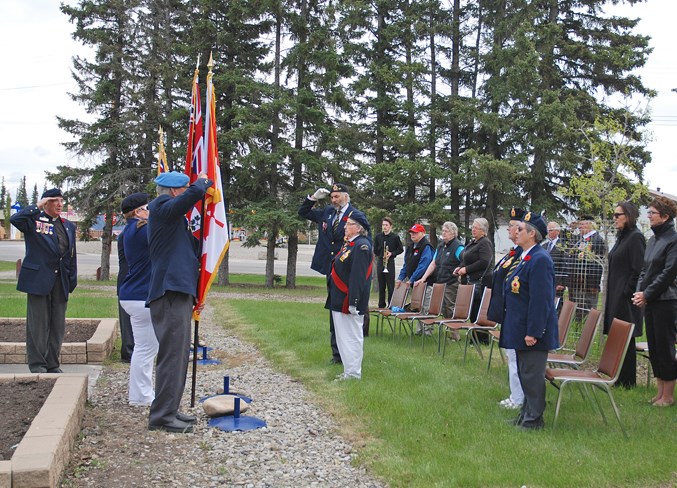 Almost two dozen people, including members of the Sundre Royal Canadian Legion Branch #223, attended the ceremony observing the 75th anniversary of D-Day. Simon Ducatel/MVP Staff
Almost two dozen people, including members of the Sundre Royal Canadian Legion Branch #223, attended the ceremony observing the 75th anniversary of D-Day. Simon Ducatel/MVP Staff
Similar to in a Remembrance Day service, members of the legion marched out the colours, which was followed by a rendition of O Canada and presentations from Schwartzenberger, Mayor Terry Leslie, and legion members Bill Edwards, Fred Gillies, and comrade chaplain Tim Kirby, who presided over the ceremony and offered prayers.
“Somehow, our Canadian soldiers and our allies brought victory at Juno Beach amid horrifying chaos,” said Leslie.
“Our challenge as we honour and remember those who served on D-Day, is to never take for granted the precious gifts of democracy, peace in our community, freedom of speech and religion, freedom to live our day-to-day lives without the fear of tyranny, and the chance to live with optimism and hope for our families and our community, and for our children and grandchildren,” he said.
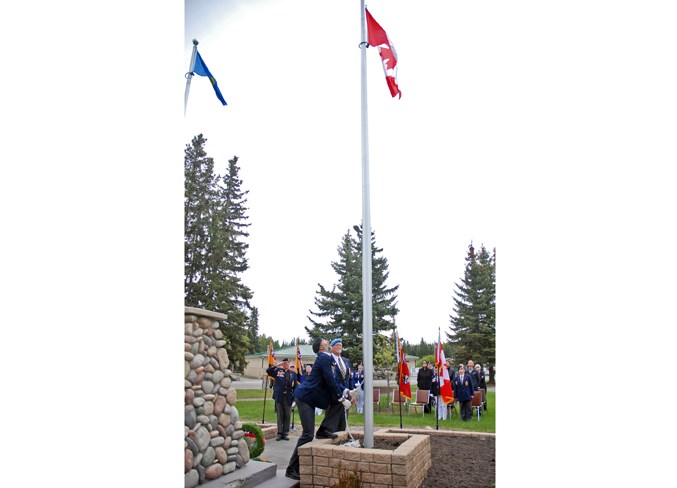 Sergeant-at-arms Jamie Moffatt and comrade Fred Gillies raise the Canadian flag near the end of the ceremony.
Sergeant-at-arms Jamie Moffatt and comrade Fred Gillies raise the Canadian flag near the end of the ceremony.
As a Canadian, the mayor said among the most humbling moments of his life was during a visit to military cemeteries in Italy two years ago and “seeing row upon row of nameless graves of Canadian soldiers, and spending time with the people of Belgium, who, 75 years later, still, each week, go through the service of the unknown soldier to show their deep appreciation and respect for the efforts and sacrifices made by Canadian soldiers to liberate their country generations ago.”
Saying "thank you" seems like a small gesture, he said, adding the two small words are seemingly inadequate to convey the depths of gratitude for the sacrifices of those who lost their lives or came home forever changed.
“But know this. It is citizens like you, here today, that remind us we can learn from history, honour that history, those sacrifices, and boldly go into our future because of the men and women who answered the call of duty to preserve and protect our values and the peace and freedom we enjoy today.”
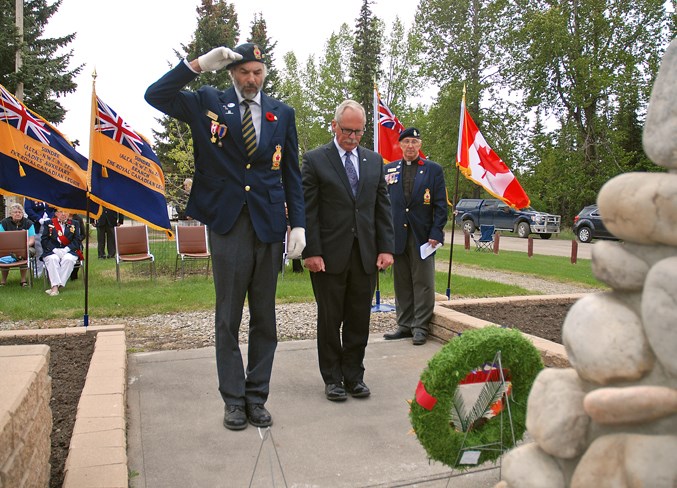 Sergeant-at-arms Jamie Moffatt salutes after Mayor Terry Leslie laid a wreath in front of the cenotaph. Simon Ducatel/MVP Staff
Sergeant-at-arms Jamie Moffatt salutes after Mayor Terry Leslie laid a wreath in front of the cenotaph. Simon Ducatel/MVP Staff
Presenters spoke of various numbers that drove home the monumental effort and loss of life involved in the operation to liberate Normandy. Total Allied casualties on D-Day alone amounted to more than 10,000, including 1,074 Canadians, of whom 359 were killed. By the end of the struggle to free Normandy, the Allies had suffered some 209,000 casualties, including more than 18,700 Canadians, with more than 5,000 dead.
The service concluded with a bugler playing the Last Post followed by a moment of silence and Reveille, the ceremonial laying of three wreaths, the raising of the Canadian flag as well as a rendition of God Save the Queen before the colour party marched out the flags.
Just before the moment of silence, Kirby said about veterans and the fallen, “Their sacrifice will ever inspire us to labour on, to the end that the country in which we live, and for which they died, may ever be worthy of the sacrifice they made.”
